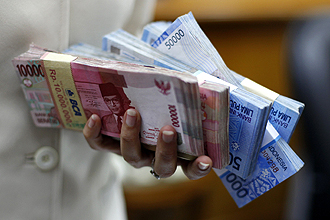The soap opera being played out in Indonesia’s mainstream media is hard to miss: the demons publicly shamed for engaging in corruption and the angels prosecuting them. So far the anti-corruption apparatus of the Indonesian government has focused on individuals likely to result in successful prosecutions. However, less headline grabbing efforts are also being made to address the culture of corruption writ large.
Indonesia’s battle against endemic corruption entered the classroom in their new academic year (from July) with a national agenda for anti-corruption education for school children through to university students. In March, a Memorandum of Understanding was signed between the Ministry of Education and the Corruption Eradication Commission (Komisi Pemberantasan Korupsi – KPK), which involves coordination on anti-corruption education and a commitment to various exchanges related to information sharing, graft control and public complaints.
Given that the pillars of AusAID’s relationship with Indonesia are its education program and Anti Corruption Development Plan, what results from this MoU will be of significant interest to Australia and to development practitioners further afield. Of course, the overarching issue that will impact results is how effective anti-corruption education can be in an institutional environment saturated by corruption.
Corruption is pervasive in the Indonesian education system. For instance, last month the Supreme Auditing Board found approximately AUD $161.5 million in accounting irregularities in the Ministry of Education’s financial reporting for 2011. This is a fraction of the total 2011 education budget of almost AUD $27 billion. An official from Indonesian Corruption Watch estimated that a great deal of the education budget is lost to corruption before it reaches schools. Corruption then continues within schools, where students, parents, school administrators and teachers are drawn into in a vicious cycle of bribery, embezzlement and extortion.
According to the KPK, an anti-corruption curriculum has been developed by the Ministry of Education that includes modules in civics for school students and specific anti-corruption subjects at the university level. The national curriculum already places a strong emphasis on moral and religious education and education on Pancasila, the five principles on which the Indonesian state was founded, of which one is social justice.
Running through much of the Indonesian commentary on what should be included in anti-corruption education, one finds the notion that there needs to be more moral education, as though students have historically been lacking. Is there the expectation that after going through civics modules and anti-corruption courses students will confront teachers regarding corrupt practice? Can you imagine a school child with great moral endowment blurting out to a teacher in class, “Excuse me, you shouldn’t accept that bribe for better results, that’s being corrupt and if you do I’ll contact KPK!” ?
No? Neither can I.
Festus Simbiak, Rector of Cenderawasih University in Jayapura (West Papua) recently said, in relation to the introduction of anti-corruption subjects in schools, “whatever form the curriculum, it will never reduce corruption”. Phillip Rekdale, an Australian who’s been fighting corruption in Indonesian education for over a decade, believes that anti-corruption education within schools can only ever be superficial without first drastically reforming the Ministry of Education. While an excellent point, there is value in anti-corruption education, even if only superficial outcomes are achieved. An understanding of anti-corruption may lead to change as institutional reforms are progressively carried out. Moreover, the cynical commentaries surrounding the current program do not offer an alternative policy for the Indonesian government to pursue. What other choices does Indonesia have? Institutional reform is an arduous, sensitive and tedious process. The pessimism from commentators stems from an unrealistic desire for an immediate and dramatic success.
Conversely, the message from the KPK encourages a realistic, long term view. The Commission suggests that after students educated in anti-corruption subjects have grown up and entered the workforce or the bureaucracy, the effectiveness of the education program will be seen. In the meantime, the program will provide publicity for and support awareness of the anti-corruption message.
Sofie Schütte, a scholar working with the Indonesian anti-corruption movement, notes that the movement in Indonesia is largely an endogenous development that is becoming successful, but that “[f]urther alliances with reform friendly government agencies and leverage beyond the support of civil society seem in need in order to reach a critical mass where corruption becomes the exception rather than the rule”. While Schütte is likely referring to domestic government agencies, I wonder what AusAID and other donors could do to support the effectiveness of an endogenous anti-corruption education program?
In the Australia-Indonesia Basic Education Program that concluded last year, anti-corruption considerations related to fund dispersal for the construction of schools rather than anti-corruption pedagogy in the curriculum. Without seeing the proposed curriculum, it’s difficult to comment on its potential effectiveness or the kind of technical assistance that could be provided to support and improve it. But fund dispersal through the community-based construction model (found to be highly effective in West Java), which limited opportunities for rent seeking for school building, could be supported by other schemes such as developing a system for safe reporting of breaches of the Teachers Code of Conduct. Many teachers are forced into participating in corrupt practices without any mechanism for recourse. If this situation could be altered, wouldn’t corruption be reduced?
Rather than a piecemeal effort, as some critics are labeling it, anti-corruption education in schools is part of the beginning of the eradication of Indonesia’s culture of corruption. It would be rash to judge its effectiveness too early. Slowly but surely, Indonesia’s efforts in anti-corruption education may provide a valuable lesson for other states ensconced in corruption too.
Colum Graham is a Researcher at the Development Policy Centre.



need to know more information about Education Against corruption in Indonesia
Very well written.